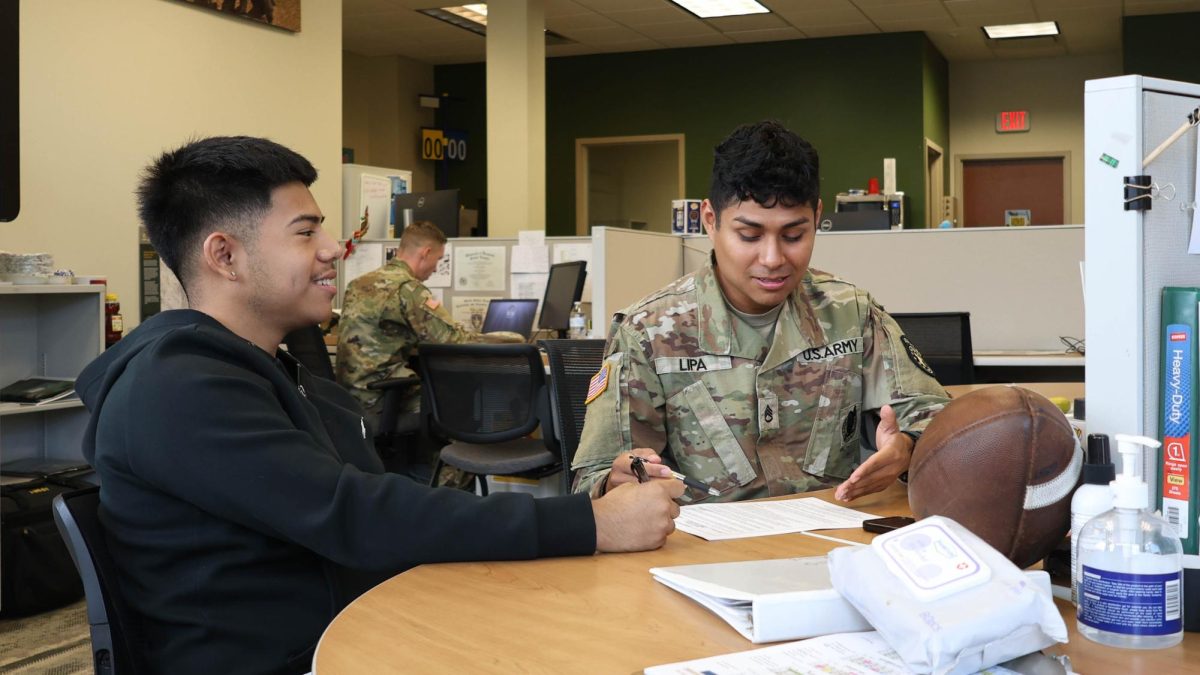As they weigh college and career options, U.S. Army recruiters show students how the military can offer many opportunities and benefits while also requiring careful consideration. By addressing doubts and misinformation about enlistment, Recruiters help recruits feel confident as they make one of the most significant decisions of their lives.
For Sgt. 1st Class Joseph Riley, commander of the Asheville Army Recruiting Station, community outreach is a vital part of recruiting. It allows recruiters to establish their presence, communicate with the Asheville community and provide accurate information about the Army and enlistment.
“You might only be here for three years, but while you’re here, embed yourself in the community,” said Riley. “That is your family for the time that you’re here.”
With over 13 years of service, Riley draws on a wide range of experiences that give him an accurate view of military life. He has been stationed at several bases across the U.S.and deployed to Afghanistan.
Riley said his philosophy on recruiting is based on honesty; that being transparent with recruits helps ease tensions one may feel from such a life-changing decision. He said it isn’t his goal to “sell” the Army, but rather to guide recruits through the decision, weighing the advantages and responsibilities of military life while clearing up misconceptions.
“I just want people to know that the Army isn’t just about combat,” Riley said. “There’s over 150 career paths from medical to engineering; it’s one of the most diverse organizations in the country.”
U.S. Army Pvt. Ryan Lavigne credits his recruiters for giving an accurate representation of what the beginning stages of his Army career would look like. A recent graduate of training as a Public Affairs Specialist, Lavigne saw joining the Army as a way to gain experience in a career field without the financial burden of college.
“It can be a good opportunity for people to climb up the societal ladder,” Lavigne said. “You get access to a lot of things like education and healthcare benefits without actively jumping into combat.”
As a recruit, Lavigne had physical training sessions with his recruiting station, modeled after how physical training in the Army functions. The recruiting station also went over military etiquette and the rank structure, which helped Lavigne be ahead of the curve when he left for training.
While Lavigne represents a soldier who already committed, others are still considering the decision. One of them is Kelsy Martinez, a 20-year-old who said he is drawn to the educational and financial benefits.
“I could get bonuses and get out of loans faster,” said Martinez. “I could get health insurance; there’s a lot of benefits from joining the Army.”
Martinez has been in contact with recruiters in the area through a combination of both job fairs and phone interviews. He said he believes the recruiters listen to his career goals and work from there to see how the Army can help him further his professional career. Martinez also said he believes the presence of Army recruiters at schools is helpful, as it makes the Army’s presence known to the community.
“They’ve been calm and informative about how it is to join and the requirements,” Martinez said. “”How you would go about joining and picking a job.”
Still, Martinez admits he feels pressure about waiting too long to enlist and worries about meeting physical requirements or facing injury, factors that make his decision more difficult.
“You might get injured or you might not meet certain requirements,” said Martinez. “It’s like a lot on the mind and on the body I would say.”
Recruiters like Sgt. 1st Class Riley said they know the conversations they have with young people can shape futures. Whether it be people committed to serving their country or people just weighing out their options, recruiters say the recruiting process is more about providing clarity than selling the Army to the public. Recruiters say they hope that with honesty, transparency and preparation, they can make a career in the Army a path worth choosing.




















